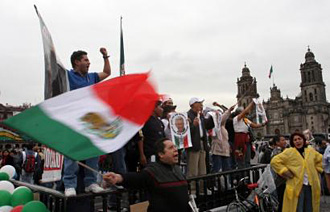 |
 |
 |
 News Around the Republic of Mexico | September 2007 News Around the Republic of Mexico | September 2007  
Mexico Strives for Gentler Elections
 Jeremy Schwartz - Cox News Service Jeremy Schwartz - Cox News Service
go to original


| | Supporters of Andrés Manuel López Obrador shouted at people entering the National Palace in Mexico City on Sept. 2 to hear Felipe Calderón give his state of the nation address. (Marco Ugarte/Associated Press) |
Mexico City - When Felipe Calderón unleashed a series of blistering television ads comparing front-runner Andrés Manuel López Obrador to Venezuelan lightning rod Hugo Chávez, most analysts said Mexico's 2006 presidential election shifted course.

The negative ads were one ingredient in a brutal two-year campaign that ended in chaos: López Obrador refused to recognize Calderón's victory, and Mexico passed through a summer of rebellion.

A year later, Mexico is dramatically overhauling its electoral process in hope of avoiding a repeat performance in 2012. Now that more than half of Mexico's states have approved the changes, the country's electoral system will more closely resemble the relatively polite European model than anything seen in the United States. The next presidential election will last only 90 days. Paid TV and radio ads will be banned, and Mexico's election authority will try to regulate the negativity out of Mexican politics.

The electoral changes, which Congress passed this month, are the result of the intense negotiation that is quickly becoming the hallmark of Calderón's young administration. López Obrador's Democratic Revolutionary Party had sought the changes since the election, and in effect traded them for a tax reform measure pushed by Calderón's National Action Party, analysts say.

The revamp has mostly been applauded in Mexico as necessary to fix the country's interminable and expensive campaigns, although critics argue it stunts freedom of expression and could lead to censorship.

"With a shorter campaign, the people will be less tired," said Rogelio Hernández Rodríguez, a political scientist at the College of Mexico. "Last year all the negativity and accusations resulted in the voters losing interest."

Most dramatically, the changes do away with paid advertising on TV and radio, which analysts say accounted for 70 percent of the estimated $350 million spent by the parties on the 2006 election.

The new policy also bans ads by special interest groups. During the 2006 campaign, López Obrador railed against ads by business groups that insinuated he would spark an economic crisis.

Instead of ads, Mexico's radio stations and two major networks will be forced to broadcast 48 minutes a day of free airtime for the candidates. Mexico's electoral authority, the IFE, can block any programming that it determines "denigrates" another candidate.

Few expect the IFE to be able to fairly or effectively police negative messages. "They are trying to elevate the level of debate," wrote former IFE president Jose Woldenberg recently. "But it will be more than difficult for the [electoral] authority to clearly establish the line between valid criticism and 'denigrating expression.' "

The overhaul has generated intense opposition among a pair of strange bedfellows: the powerful TV and radio lobby, which has blasted the legislation as "Soviet," and citizen groups that worry the laws will limit their influence.

"During campaigns we come out against candidates we feel are not doing their job correctly," said Jose Antonio Ortega, president of a citizen group that monitors public safety. "This is a restriction on our freedom of expression."

The new rules, however, don't mention anything about Internet proselytizing, and interest groups like Ortega's are expected to turn to the Web to reach the masses.

Others have worried the changes, instead of advancing Mexican democracy, represent a return to the authoritarian past. They give the parties more control over the independent electoral authority and remove Luis Ugalde, Federal Electoral Institute president, who was demonized by López Obrador after the election.

And some analysts say that the ban on advertising could bring back the days when political parties paid journalists under the table for favorable reporting.

"Today the incentive to operate in darkness will be greater," wrote political analyst Alfonso Zarate in the Mexico City daily El Universal. "The media will still have the power to create or destroy images; | 
 | |
 |



